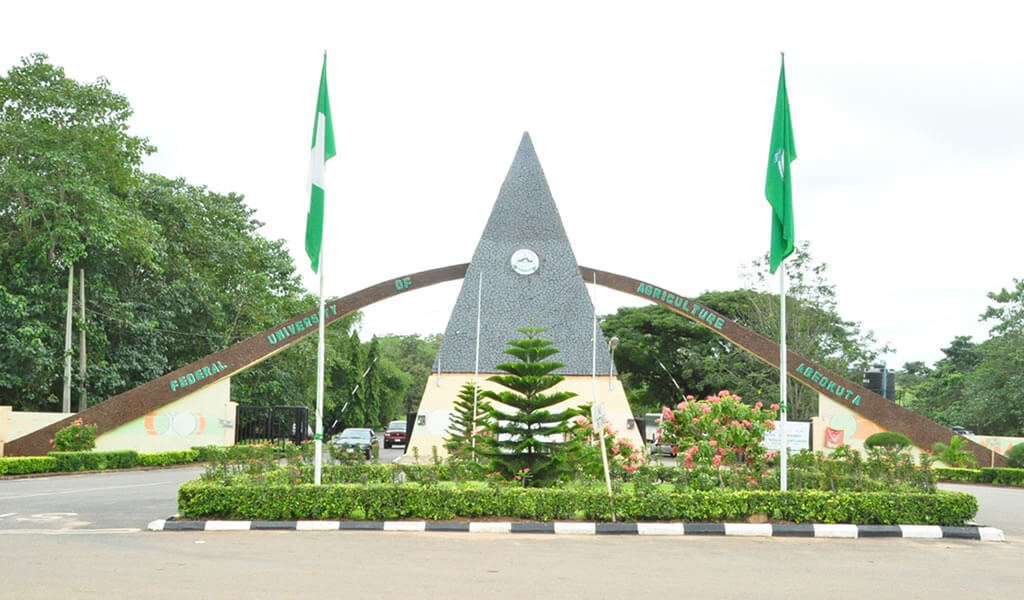The University’s Governing Council, during its 65th Statutory meeting on December 17, 2010, established The Centre for Community-Based Farming Scheme (COBFAS) to coordinate the implementation of the One Year Farm Practical Programme for the Bachelor of Agriculture Degree candidates at the penultimate year of their programme. This action makes the University to be one of the first to scale up the ‘hitherto’ six months internship programme to one year. The Centre was established to bring the Bachelor of Agriculture (B. Agric.) students close to the realities and practice of agriculture in Nigeria. It is in the wisdom of the University that the students should have first-hand training and experience in communities where Nigerian farmers reside and practice farming within the same socio-economic system where the farmers operate. This provides the student-trainees with the opportunity to live and work on the farm in rural communities. The overall aim is to stimulate the students’ interest in agriculture and motivate them to take up agriculture as a career and be integrated into the Nigerian rural setting where they will practice agriculture upon graduation. With their training, expertise and support from the University, the students will overcome some of the challenges in farming and utilise the experience in starting an agricultural enterprise.
The University being conscious of its catchment area of the southwest state of Nigeria started COBFAS in four communities in Ogun State. The communities are Isaga-Orile in the Egba zone, Odogbolu in the Ijebu area, Ode-Lemo in the Remo division and Iwoye-Ketu in the Yewa end of the Ogun State. This is to take advantage of the different ecological zones in the states and make the impact of the University felt in all the political zones of the states. The Centre test ran the scheme with over 600 FPY students in these four locations from March 21 and September 19, 2011, during the 2010/2011 academic session to successfully transition from the old B. Agriculture programme to the new one.
1.0 MODIFICATIONS TO FPY PROGRAMME
In June 2015, the FPY programme was reviewed following the University Senate’s approval at its 206th statutory meeting. Hence, from the 2015/2016 Academic Session, the practical farm year (FPY) would have (2) components which are:
(a) On-Campus training for the students in order to take advantage of available facilities on campus for four (4) months
(b) Community-based training in the COBFAS locations for four months.
In order to effectively achieve the set goals of COBFAS and to transform hoe and cutlass farming to mechanisation, the University Senate (Senate paper 2264) on July 25, 2019, approved the modification of FPY activities. The main modification is the transformation of traditional hoe and cutlass farming to mechanised commercial farming. The University Management supported the modification by providing the needed equipment (two additional tractors to the existing two and their complement implements, fertiliser spreader, boom sprayer, combined harvester and seed processing equipment). The University Management also provided funds to open an additional 30 ha of land in 2019 and 15 ha in 2020 cropping seasons, in addition to the existing 17 ha totalling 62 ha for the production of various crops (maize, rice, yam, tomatoes, pineapple, etc) in the Campus. The modification also includes the extension of the periods of training from six months to eight months, four months each for large scale mechanised farming on Campus and COBFAS villages. Besides, each student is expected to spend four months in the four COBFAS villages but a month in each location instead of staying in a particular village for two months. The rationale behind rotating students among the four villages is that the locations are different in socioeconomic development, agricultural ecological zone, culture and norms; hence, all students shall be exposed to the same environments and experiences. Besides, the existing private farms within the community have varying agricultural enterprises, which will immensely benefit the entire students equally rather than pinning the students to one location in two months. Furthermore, we cannot successfully grow arable crops in two months except vegetables.
Based on the highlighted modification, the entire FPY student population shall be broken down into two batches (batch A and batch B). The two batches shall be rotated between the campus and the COBFAS community-based training as presented in Table 1:
Table 1: Programme and mode of batch rotations
| Months Per Location | Batch A | Batch B |
| Orientation week | Two weeks | |
| First 4 months | FUNAAB | COMMUNITY |
| Second 4 months | COMMUNITY | FUNAAB |
| Wrap-up and preparation for exams | One week practical free followed by examination | |
Furthermore, to make the practical more effective and efficient on-campus, the students shall be divided into small groups[1], each group having about 34 and 40 students to be rotated among selected 16 agricultural enterprises. The selected agricultural enterprises comprise include: i) Agricultural Extension/Agricultural Economics/Agricultural Administration, ii) Piggery, iii) COBFAS farm, iv) Pasture (growing of fodder crops, make hays and silage), v) Tractor Driving, vi), Feed mill, vii) Rabbit and grasscutter, viii) Ruminants, ix) Plantation, x) W/shop, xi) Organic Agriculture/Yam Minisett/COLPlant, xii) Hatchery, xiii) Poultry, xiv) Postharvest- Processing of gari, fufu, xv) Palm oil Processing, and xvi) Agrometeorology.
Similarly, Community-based students shall be divided into four equal groups (Isaga-Orile, Odogbolu, Ode-Lemo and Iwoye-Ketu), and each group shall go to their respective village or community to acquire the first-hand agricultural training experience in a rural setting for one month each at each of the COBFAS community. In order words, each student shall have the opportunity to go around the four communities. While the students are in the communities, the students shall further be sub-divided into smaller groups. The smaller groups shall go to the farm two days a week and two days on rotation among the selected crop, livestock farms and processing firms based in each COBFAS community they found themselves.
2.0 TERMS OF REFERENCE
- Implement the Farm Practical Year (FPY) programme in the various COBFAS Locations/Communities and the University campus.
- Provide quality enterprise-based training for agricultural students at 400 level towards producing future modern farmers and efficient agricultural entrepreneurs for the country.
iii. Integrate agricultural students into the local community production system and rural working conditions for proper understanding of rural environments in Nigeria and developing a better perspective towards rural and agricultural development issues in Nigeria.
- Promote a cordial relationship between COBFAS communities and FUNAAB to achieve mutual benefits for the two parties.
- Collaborate with relevant agencies and organisations towards improving agricultural production activities in the COBFAS locations and empowering community dwellers for improved livelihood.
- Conduct timely training and capacity building for local farmers in COBFAS locations towards improved agricultural production and enhanced local food security.
3.0 VISION, MISSION AND OBJECTIVES OF COBFAS
3.1 Vision: To produce a highly-skilled workforce that will drive the economy in the rural communities in Nigeria through agriculture for sustainable development and food security.
3.2 Mission: To contribute to sound training of agricultural students toward building great future modern farmers for sustainable development in line with the mission of the Federal University of Agriculture, Abeokuta.
3.3 Objectives:
- Training and capacity building of young agricultural undergraduates to achieve improved and sustainable agricultural production and productivity.
- To produce a generation of modern farmers that are willing to take up agriculture in the rural communities and impact positively on the lives of the communities.
iii. To accelerate agricultural commercialisation and agro-industrial development in the communities.
- To create job opportunities for youths in the rural communities and encouraging them to take up agriculture as a business.
- To promote natural resource management/organic agriculture.
- To achieve universal food security and protect the vulnerable households from hunger and abject poverty.
vii. To contribute to food security and reduce poverty in the selected communities.
viii. To make the impact of the University felt in the selected communities.
4.0 KEY COMPONENTS OF THE SCHEME:
In fulfilling the objectives and addressing the key components of the scheme, COBFAS has several farm production activities that the student trainees go through in the course of the training. The activities are:
- Development of rain-fed and irrigated crop farming: This involves the following crop-based enterprises and activities:
* Vegetable production
* Nursery production
* Organic farming
* Arable farming
* Plantain production and rapid multiplication of plantain suckers
- Livestock farming: The livestock farming activities is composed by the following micro and macro livestock-based enterprises:
* Poultry production
* Ruminant (cattle, sheep, and goat) production
* Rabbit production/fisheries
* Apiculture
* Aquaculture
* Piggery
* Cane rat production
iii. Institutional support and strengthening: As part of its component on community impact, the University through COBFAS, has committed itself to the following:
* Local infrastructural development
* Equipment support for agricultural production
Apart from making life comfortable for our students in different locations, the programme is aimed at contributing to rural development and improved living condition in our locations.
- Processing, packaging and marketing strategies: As a way to reduce post-harvest losses and improve the agricultural value chain, the training programme also focuses on post-harvest activities such as:
* Garri production
* Cassava chips and flour production
* Cheese production and pasteurisation
* Meat processing
* Seed production, processing and packaging
These will enrich students’ knowledge on value addition and marketing strategies for agricultural produce.
- Training and human capital development: Beyond the farm activities, the programme gives students opportunities to participate in the processing of live broilers and fish into dry storable forms. The processing equipment and combined harvester newly acquired by the University is readily available for students.
5.0 ORIENTATION/INSTRUCTIONS/LECTURES
Prior to departure to the various communities, it is compulsory for all trainees to attend orientation/Instruction/Lectures for two weeks. During this period, the students would be briefed on the structure, content and expectations of the programme. College representatives on the supervisory board will provide an overview of each course and instruct the students on how to carry out practical aspects of each course during the orientation programme.
During the weeks of orientation, the students are expected to do the following:
- Registration of Courses
- Payment of FPY contribution fee
- Hostel Accommodation
Hostel Accommodations are provided by the University in each of the communities at subsidised fees. A clearance form duly completed must be obtained from the Director, COBFAS before any student can be allotted a bed space in the locations. Generating sets are equally provided.
Note: Students are advised not to rent accommodation outside the school hostel provided.
6.0 QUALIFICATION TO REGISTER FOR FPY:
For any intending FPY student to qualify for the FPY programme, he/she must clear and pass 17 or more units of lower-level courses in both the first and the second semesters. In order words, the total sum of units of carryover courses must not exceed 16 units (it may be equal to 16 units but not more than 16) in each semester. Even if a semester is 16 or less and the second semester is higher than 17, such a student is qualified.
[1] Each group of students will spend 2 working days per week on COBFAS IFSERAR farm (i.e. Monday s & Tuesdays) and 3 working days per week for each enterprise (i.e. Wednesdays, Thursdays and Fridays)


